
The Iran–Iraq War, also known as the First Gulf War, was an armed conflict between Iran and Iraq that lasted from September 1980 to August 1988. Active hostilities began with the Iraqi invasion of Iran and lasted for eight years, until the acceptance of United Nations Security Council Resolution 598 by both sides. Iraq's primary rationale for the attack against Iran cited the need to prevent Ruhollah Khomeini—who had spearheaded the Iranian Revolution in 1979—from exporting the new Iranian ideology to Iraq. There were also fears among the Iraqi leadership of Saddam Hussein that Iran, a theocratic state with a population predominantly composed of Shia Muslims, would exploit sectarian tensions in Iraq by rallying Iraq's Shia majority against the Baʽathist government, which was officially secular and dominated by Sunni Muslims. Iraq also wished to replace Iran as the power player in the Persian Gulf, which was not seen as an achievable objective prior to the Islamic Revolution because of Pahlavi Iran's economic and military superiority as well as its close relationships with the United States and Israel.

The Gulf War was an armed conflict between Iraq and a 42-country coalition led by the United States. The coalition's efforts against Iraq were carried out in two key phases: Operation Desert Shield, which marked the military buildup from August 1990 to January 1991; and Operation Desert Storm, which began with the aerial bombing campaign against Iraq on 17 January 1991 and came to a close with the American-led liberation of Kuwait on 28 February 1991.

The 2003 invasion of Iraq was the first stage of the Iraq War. The invasion began on 20 March 2003 and lasted just over one month, including 26 days of major combat operations, in which a United States-led combined force of troops from the United States, the United Kingdom, Australia and Poland invaded the Republic of Iraq. Twenty-two days after the first day of the invasion, the capital city of Baghdad was captured by coalition forces on 9 April after the six-day-long Battle of Baghdad. This early stage of the war formally ended on 1 May when U.S. President George W. Bush declared the "end of major combat operations" in his Mission Accomplished speech, after which the Coalition Provisional Authority (CPA) was established as the first of several successive transitional governments leading up to the first Iraqi parliamentary election in January 2005. U.S. military forces later remained in Iraq until the withdrawal in 2011.
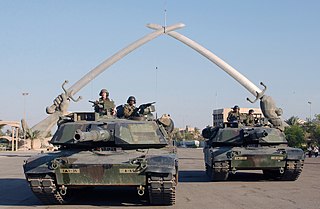
The following is a timeline of major events during the Iraq War, following the 2003 invasion of Iraq.

Al Anbar Governorate, or Anbar Province, is the largest governorate in Iraq by area. Encompassing much of the country's western territory, it shares borders with Syria, Jordan, and Saudi Arabia. The population is mostly Sunni Arabs. The provincial capital is Ramadi; other important cities include Fallujah, Al-Qa'im and Haditha.

An Iraqi insurgency began shortly after the 2003 American invasion deposed longtime leader Saddam Hussein. It is considered to have lasted until the end of the Iraq War and U.S. withdrawal in 2011. It was followed by a renewed insurgency.
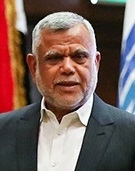
Hadi al-Amiri is an Iraqi politician who is the head and secretary general of the Badr Organization, a Shiite political party and paramilitary organization based in Iraq.

The Iraq War, sometimes called the Second Persian Gulf War, or Second Gulf War was a protracted armed conflict in Iraq from 2003 to 2011. It began with the invasion of Iraq by the United States-led coalition that overthrew the Ba'athist government of Saddam Hussein. The conflict continued for much of the next decade as an insurgency emerged to oppose the coalition forces and the post-invasion Iraqi government. US troops were officially withdrawn in 2011.

Abu Ayyub al-Masri, also known as Abu Hamza al-Muhajir, born Abdel Moneim Ezz El-Din Ali Al-Badawi, was an Egyptian militant leader who was the leader of Al-Qaeda in Iraq during the Iraqi insurgency, following the death of Abu Musab al-Zarqawi in June 2006. He was war minister of the Islamic State of Iraq from 2006 to 2010 and prime minister of the Islamic State of Iraq from 2009 to 2010. He was killed during a raid on his safehouse on 18 April 2010.
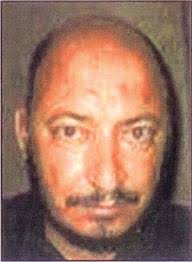
Abu Omar al-Baghdadi, born Hamid Dawud Mohamed Khalil al-Zawi was an Iraqi militant who was the Emir of the Islamic militant umbrella organization Mujahideen Shura Council (MSC), and its successor, the Islamic State of Iraq (ISI), which fought against the U.S.-led Coalition forces during the Iraqi insurgency.

Operation Southern Watch was an air-centric military operation conducted by the United States Department of Defense from August 1992 to March 2003.
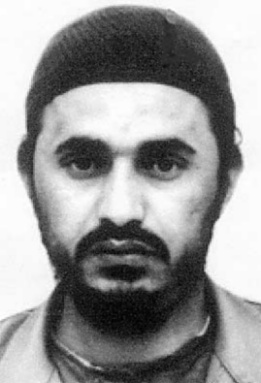
Abu Musab al-Zarqawi, born Ahmad Fadeel al-Nazal al-Khalayleh, was a Jordanian jihadist who ran a terrorist training camp in Afghanistan. He became known after going to Iraq and being responsible for a series of bombings, beheadings, and attacks during the Iraq War, reportedly "turning an insurgency against US troops" in Iraq "into a Shia–Sunni civil war". He was sometimes known by his supporters as the "Sheikh of the slaughterers".

The Islamic State (IS), also known as the Islamic State of Iraq and the Levant (ISIL), the Islamic State of Iraq and Syria (ISIS) and by its Arabic acronym Daesh, is a transnational Salafi jihadist group and an unrecognised quasi-state. Its origins were in the Jai'sh al-Taifa al-Mansurah organization founded by Abu Omar al-Baghdadi in 2004, which fought alongside Tanzim Qaidat al-Jihad fi Bilad al-Rafidayn during the Iraqi insurgency. The group gained global prominence in 2014, when its militants successfully captured large territories in northwestern Iraq and eastern Syria, taking advantage of the ongoing Syrian civil war. It is well known for its massive human rights violations and war crimes. It engaged in the persecution of Christians, Mandaeans, Shia Muslims, and Sufi Sunnis, published videos of beheadings and executions against journalists and aid workers. By the end of 2015, it was internationally considered to be one of the biggest terrorist organizations of all time and it ruled an area with an estimated population of 12 million people, where it enforced its extremist interpretation of Islamic law, managed an annual budget exceeding US$1 billion, and commanded more than 30,000 fighters.

The war on terror, officially the Global War on Terrorism (GWOT), is a global counterterrorist military campaign initiated by the United States following the September 11 attacks and is the most recent global conflict spanning multiple wars. Some researchers and political scientists have argued that it replaced the Cold War.
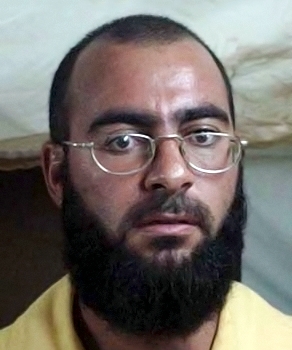
Ibrahim Awad Ibrahim Ali al-Badri, commonly known by his nom de guerreAbu Bakr al-Baghdadi, was an Iraqi militant who was the first caliph of the Islamic State (IS) from 2014 until his death in 2019.

Operation al-Shabah was launched in May 2013 by the Iraqi Army, with the stated aim of severing contact between the Islamic State of Iraq and the Levant and the al-Nusra Front in Syria by clearing militants from the border area with Syria and Jordan.
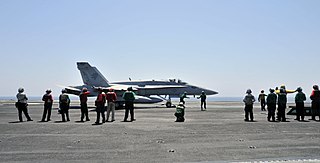
On 15 June 2014 U.S. President Barack Obama ordered United States forces to be dispatched in response to the Northern Iraq offensive of the Islamic State (IS), as part of Operation Inherent Resolve. At the invitation of the Iraqi government, American troops went to assess Iraqi forces and the threat posed by ISIL.

Abd al-Rahman Mustafa al-Qaduli, better known as Abu Ali al-Anbari, was the governor for territories held by the Islamic State of Iraq and the Levant (ISIL) in Syria. Considered the ISIL second-in-command, he was viewed as a potential successor of ISIL leader Abu Bakr al-Baghdadi.

The 2017 Western Iraq campaign was the final major military operation of the 2013–2017 war in Iraq, in the western province of Anbar, and on the border with Syria, with the goal of completely expelling ISIL forces from their last strongholds in Iraq.
Abdul Nasser Qardash is an Iraqi militant who in 2019 was wrongly reported as the leader of the Islamic State of Iraq and the Levant (ISIL). He was also nicknamed "The Professor" and "Destroyer". Qardash was a high-ranking and very influential member of ISIL with close connections to its first caliph, Abu Bakr al-Baghdadi, and tipped as a potential candidate for ISIL leadership succession. However days after the death of al-Baghdadi, Abu Ibrahim al-Hashimi al-Qurashi was ultimately chosen as the new declared leader of ISIL. Qardash was captured by Iraqi security forces in 2020.


















